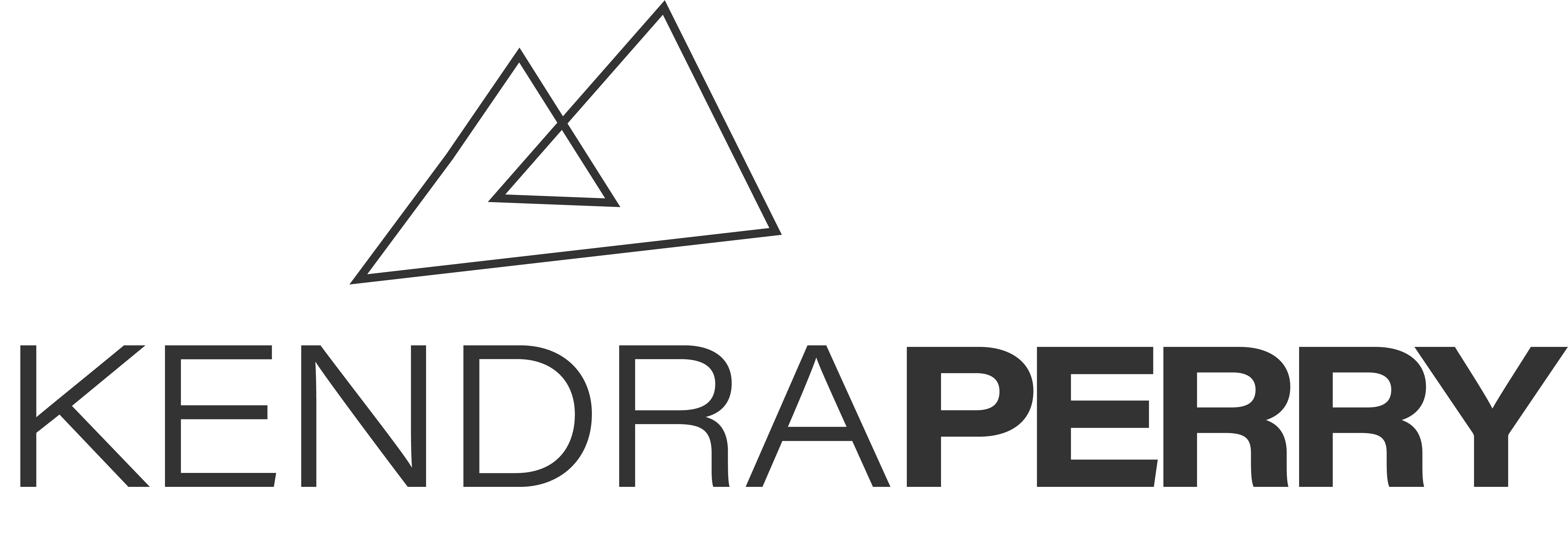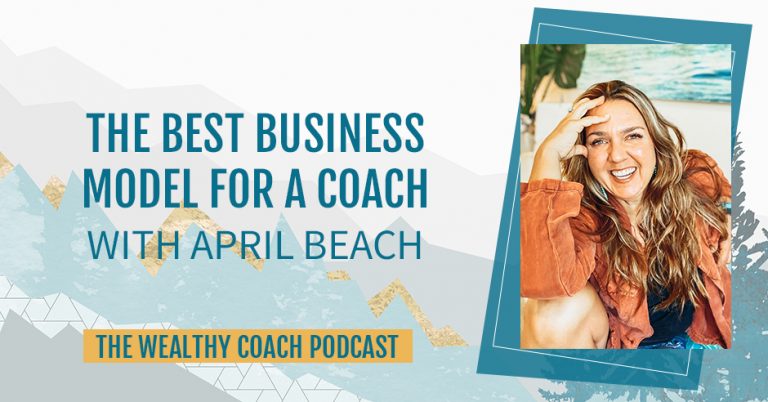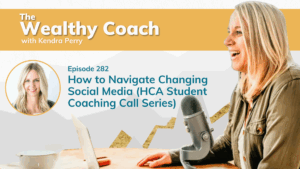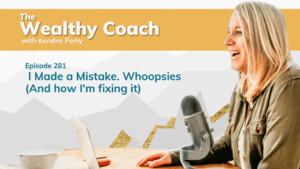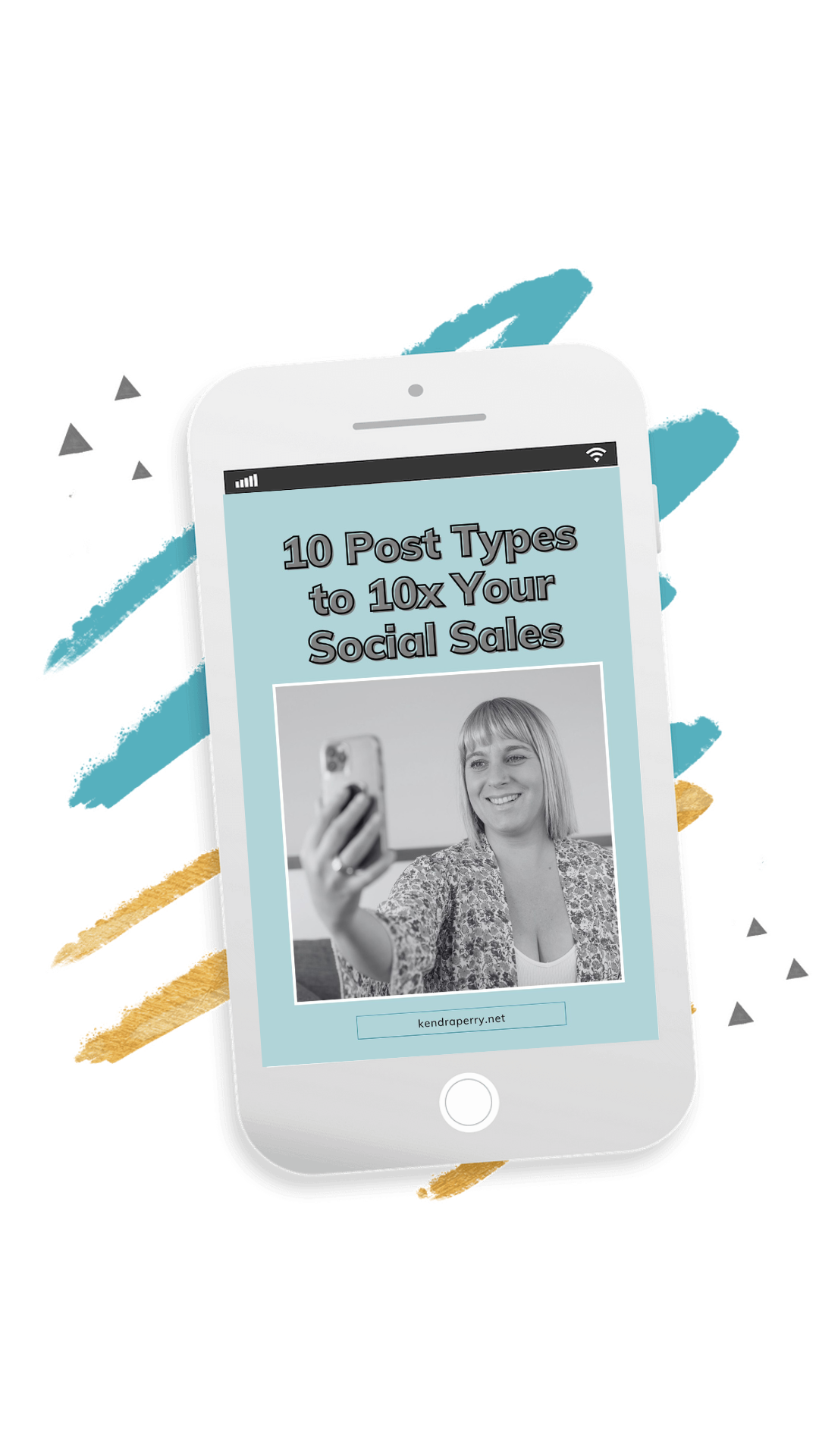Business models – Do you need one? Absolutely, yes. You need one if you plan to make money online.
Why? Because a business model is essentially the way in which you make money – so DUH! You need one!
Choosing a business model is not something that should be taken lightly. Your business model NEEDS to be compatible with your lifestyle or….enter burnout, misery and hate for your biz (not good!).
Determine the lifestyle you want to have first and THEN choose a business model that supports that.
In this episode of the Wealthy Coach Podcast, I’m chatting with April Beach about:
- How your business model can make or break you;
- Why you need to stop looking at what other coaches are doing to make money;
- How to prevent building a business you hate;
- What it means to scale your business;
- The problem with the online course industry;
- How to choose the right program for your desired lifestyle.
How to stay connected with me:
Send me a message on Instagram: @kendraperryinc
Join my email community for weekly entertaining & actionable biz tips: kendraperry.net/biz-tips
Follow me on Pinterest: pinterest.com/kendraperryinc
Subscribe to my YouTube Channel: kendraperry.net/youtube
Connect with April: @aprilbeachlife
——————————————————————
Learn how to nail your sales calls! Join my Rock Your Sales Calls Workshop. Find out more at: go.kendraperry.net/sales
——————————————————————
We would LOVE if you showed your love for this episode by leaving us a 5-star review! Not sure how? Here are a few ways to do it.
1) How to leave a 5-star review from your iPhone: https://www.loom.com/share/b187ff4fbfbf4beeb0a42e7b1179f7cc
2) How to leave a 5-star review from your desktop (android users): https://www.loom.com/share/a80c774f0a534f77a42df2f6b46feba7
—
Send in a voice message: https://anchor.fm/thewealthycoach/message
Support this podcast: https://anchor.fm/thewealthycoach/support
—
Listen to the podcast here:
The Best Business Model For A Coach With April Beach
Do you know what a business model is? If not, we need to have a little talk because a business model is a way in which you are going to make money in your business. It’s a little bit important but here’s the thing. If you choose the wrong business model, the one that is incompatible with your desired lifestyle then you will find yourself not only exhausted but you might be hating your business too. This is why it’s so very important to understand the lifestyle that you want first and then build your business model around your lifestyle, second.
On the show, I sit down with Master Online Business Strategist and Owner of the SweetLife Entrepreneur Company, April Beach, to discuss how to choose a business model that works for your business and your life. April is going to teach us how your business model can make or break you, why you should stop looking at what other coaches are doing to make money? The most effective and profitable business model for new entrepreneurs like you, how to prevent building a business you hate, what it means to scale your business and how to do it? The problem with the online course industry, and why you should avoid building a traditional course and the type of program that will position you as an expert in your industry and create raving testimonials with your clients?
April Beach Founded the SweetLife Company in 2012 with a specific focus on guiding entrepreneurs and small businesses to launch, grow, and scale online. Featured by MSNBC, Today, Patagonia, and the New York Times, she quickly became the go-to resource for online business strategy for the purpose of achieving lifestyle freedom intentionally building a business around life and family. Now, as a renowned business scaling expert, April helps entrepreneurs and small business owners take the lead by launching and scaling their companies online by developing world-class offers, services, and programs through the start skill system, her service creation system, consulting online programs, and our top-rated podcasts, the SweetLife Entrepreneur Podcast. My wealthy coaches, I know you’re going to love this episode, so let’s dive in.
—
Welcome to the show, April.
Thank you. I’m so excited to be here.
I’m excited too. I recorded on your podcast, which was exciting for me because I listened to the SweetLife Entrepreneur Podcast. Highly recommended, everyone, and now you’re on mine, so it feels special. I appreciate you being here.
It feels special being on your show. It makes me feel good about myself.
I’m excited to talk about our topic. We’re going to be talking about the possibility of business models. I was saying to April, one time I was on my little pedestal high horse going off about business models and someone was like, “What’s a business model?” People don’t even know what that is. April, I wanted to find that but first, I want to hear your story. How did you become such a badass power woman?

Thank you, first of all, for having me on the show. I am excited to be here and talk to your people so nice to meet you guys. Kendra’s followers are super smart people. I’m not a badass. I’m a rebel. I’m a free spirit type of person. I thrive on going against the grain. My whole entire life, whether it was my story or the way my parents first started raising me, those even like a little chip on my shoulder of intentionally trying to defy the status quo at a young age. I learned that from my mom at a young age. Everything I’ve done has been with this need to want to do things differently, to disrupt things. When I was young, I used to piss people off.
When I got older, I was to prove to myself that I could do things. Frankly, I should have never have been able to accomplish it. I’ve been an entrepreneur my whole life. I feel blessed to have a cool story. Grew up, my parents owned surf shops in California and Hawaii. I lived in California in the Winter and Hawaii in the Summer. I was the kid that on a great beach day, my mom would literally pull up, take me and my sister out of school because the waves were up or because it was 80 degrees on the Central Coast of California. That didn’t happen very often in February or March. I always believed that life in play always came first.
I’m not one of those who work first and then play second. We can do both simultaneously for sure. I learned how to build unconventional business models from my parents. When my dad wanted to surf more, we open up surf shops. When we wanted to travel up and down the Coast, he would build Oak beach chairs and we’d sell them at arts and craft shows all over California. When he wanted to play more beach volleyball, we opened the first beach volleyball retail store in Santa Barbara. It was all so that we could get the cool stuff and we could play the game. I learned that at a young age. I always remember thinking of all those other kids being sucks for you that you’re stuck in school.
That’s not going to serve me. I’ve carried that forever and started creating my own company. I started business consulting and consulting other companies when I was about nineteen years old. I got my first big girl business consulting job developing a business model, ironically having no idea what I was doing. I was 21 and was hired by a big company to develop an integrative medicine of all things business model. I totally pulled it out of my ass. I had no idea what I was doing. I went to college a lot because I liked to learn. I never got a degree in anything. It was a kickoff realizing that there are so many people that want this unconventional type of business development. Twenty-four years later, that’s all I’ve done. It’s to coach other businesses to build lifestyle focus, business models. That’s a long way round explaining how I got here.
I can’t remember if I heard you say this on a podcast or Instagram but you’re talking about build the lifestyle and then build the business around it, which is incredibly important because a lot of new business owners ended up creating a job for themselves within their business and they feel overwhelmed and stressed. It’s very similar to what they were doing before except for now they have a lot of pressure on them. I love this idea of creating a business around the lifestyle. We also have a lot in common. I was definitely a rebel, disruptor in high school. My parents didn’t take me surfing but they took us out of school to go skiing. I always thought, “It sucks for you to go to school while I’m skiing in the mountains.” I love that. That’s such a cool story. Let’s dive into the topic because I want to talk about business models. I want you to start by defining that. There are probably people in our audience who are like, “What is a business model?”
In hindsight, by the way, even though I was hired in my first big girl business coaching role to develop a business model, nobody had ever used that terminology then. I didn’t realize until I was in my mid-30s that’s what I did for these people. People will throw around or somebody who might be an investor will be like, “What’s your business model?” It makes you feel so stupid and it shouldn’t. Let’s go ahead and break it down. A business model is very simply how you serve clients and how you make money.
The business model is the activity that you choose to deliver your client’s results and how you bill for that. Some examples of business model are one-on-one coaching, launching an online course, and there are different variations within each type. You could launch a membership community. Your business model is to host or charge people to attend a monthly event. It could in fact even be selling digital products or digital downloads. That’s another business model as well. The business model is simply that, how you serve clients and how you make money.
That makes it sound so simple. People maybe call it something different. That makes a lot of sense. I know you are heavily focused on lifestyle. How do business model and lifestyle go together and why is business model important for lifestyle?
I’m so glad that we’re talking about this on the show. The business model you choose is going to affect how you work, when you work, who you work with, and how long it takes you to perform that work. If you don’t choose a business model and have the understanding of what that business model looks like in daily operations, in the future, and this happens all the time, you could end up building something that you hate, as you were saying. They end up creating something that’s like a job. Here is why that happens. We can dive into this a little bit. It’s always something that get on my soapbox about a bit but when we aren’t sure what we’re doing, we tend to copy what other people are doing.
We can say, “She’s launching a course. Look at how much money she’s making. I should launch a course. She’s having virtual events or she’s hosting a retreat. I should do that too.” You look at it for a few hot minutes and you think that it looks great. Usually, the financial idea of the outcome of that is sexy and you want to do that. The reality is there’s a good chance that is going to be a disaster for your individual life. That’s why people don’t mean to launch their own business model intentionally but they don’t have a full awareness of what that business model does to their life like how that business model affects their life on a daily basis, weekly basis, and yearly basis and what that means.
I got off a call with a client and she has launched this amazing membership community. Within the membership community, she promised a certain amount of one-on-one time which was something that I had advised against. She wanted to do that, so she had offered this one-on-one time. She has reached capacity in this membership community and she is absolutely exhausted but she has sold it for the next twelve months. She is frankly stuck there. The fact that she wanted to do that, there are a lot of things we all want to do and we’re so excited about it. If we give ourselves permission to look at what that’s going to do in the long run, in most cases, you might want to make some changes. She found herself in that place. “Is she making money?” That’s for sure. “Is she totally exhausted and now bound to this particular place that she has to be multiple days a month?” Yes. That’s how the business model affects your life.
I love this discussion because when I first started out as a health coach, I was doing one-on-one and I wanted the lifestyle. The one-on-one coaching wasn’t allowing me that. I was getting caught up in the email, admin, appointments, having to show up at a certain time, and needing to have a certain amount of clients on my schedule to make the money. I got so burnt out and that’s where business model became important for me because I was like, “What is the business model where I still support people and feel I’m changing lives yet I can go do my thing, be skiing, mountain biking, and have this time to vacation when I want.”
I travel 4 to 6 months a year and I have for a very long time. I also have three kids. Figuring out how to do that with work, all comes down to business modeling. We’re not going to dive into this necessarily but I do have to say something so that your audience that are like, “This sounds so awesome.” The business comes second. That’s what we’re talking about now. The most important thing that everybody needs to understand, the first thing, or the prerequisite to deciding what your business model is, is creating a world-class offer. Whatever that is. It’s taking your unique thoughts, ideas, and all those things. Make sure of your offer.
What I’m saying is make sure that your offer, you are creating and building can dictate what you want and need to charge for the business model you choose. If you have a crappy offer, you’re not going to be able to charge $10,000 a person. For example, “I want to still work with clients privately one-on-one, but I want to make more money.” You have to create an offer that is more valuable then because you’re going to need to work with fewer clients in order to charge more. That might be stating the obvious to some people. We need to make sure the offer aligns with the price point that you want aligned within that business model. Figuring that out.
I want to say that again because people don’t say that much and it’s not a sexy thing to say. Everybody is like, “I want to launch a course or a new business,” or whatever. One-to-one is the fastest way to scale your business. Here’s why and this is what Kendra and I know. Hopefully, we’ll save you guys lots of time if you don’t know this yet. When you meet with a certain number of people one-on-one, the very first thing you’re going to do is you’re going to see a pattern in the most frequently asked questions, the most common things you cover, the most important information that people want to know. You’re also going to see certain patterns where people are getting stuck and might need more help.
You don’t know that as an expert until you’ve tested what you’re delivering your content and your coaching material on people one-to-one. For some people, it might only take them meeting with six people one-on-one. That was the case of the very first business that I launched on my own. I only met with six clients one-on-one before I launched a program and group course. Some of you guys might have to meet with 60 or 600 people to see the patterns, depending on how intricate of information you’re delivering to your clients. First of all, one-on-one is, by far, the number one, no pun intended, way that I recommend businesses start out for whatever amount of time you need to be there. You’re going to gain confidence, get testimonies, and beta-test your stuff.

That’s what we’re talking on my podcast, about beta launching. It’s the first beta before an actual beta is one-on-one and then you go into scaling. Number one, it always comes down to giving the clients results first. The first question you want to ask yourself is, “How best am I going to be able to get these people results? What do they need from me in a way that I can deliver this in more of a group setting?” You ask yourself and here’s the question you got to ask yourself, “Do I want to do that? Is that fun to me? They might need me to show up every Thursday or Sunday night, whatever to meal prep at 6:00 with them in a Facebook group but I don’t feel like doing that. That’s not my life. How else then can I meet their needs with showing up in a way that aligns with what I want to do too?”
Thank you so much for saying that because it’s so true and I’m totally on the same page with you. A lot of my students come through my programs and they’re like, “I want to do a course.” I’m like, “I get that but start with one-on-one even if it’s not your ultimate goal.” What you said is there’s so much value in the information that you get from them. You learn so much even if you work with 5 to 10 one-on-one clients, that could be enough to be able to be significantly more successful in a different type of business model like group and one-on-one. I also love that you said, ask yourself, “Is this how I want to support people?” I see a lot of shoulds. “I should be doing a Facebook group. I should be doing this and that.” Obviously, you want your people to be supported but it has to fit into how you want to support people.
A couple of things along those lines. Amy Porterfield was on my podcast years ago and we were talking about this. I remember pinpointing her down to the question, how long should people be in business before they launch their first course? She is upfront about that even though she sells the creation courses and she’s like, “Usually I see on average at least a year.” That’s a big thing because we have so many new businesses that are starting out saying I want to start with launching a course. Here’s the other thing if you haven’t built a course yet and we can totally talk about variations of courses and whatever you feel would be best for your audience.
Courses are a lot of work to build. I don’t care if you have two modules in there. They are so much work. First, extract your intellectual property from your mind, lay it out in a way that you are guaranteeing your people that you’re going to get them predictable transformational results, and then building the content into an online platform, which frankly, most entrepreneurs are not tech experts. There’s that whole learning curve of figuring out what platform, what’s this, what’s Kajabi, what’s Thinkific, and all these other things. There are so many layers to it. I see so many businesses. Entrepreneurs come to me usually after they have tried things for a long time on their own, nothing has worked, they’re super exhausted, and most of them have spent so much money, they’re even broke.
What happens is they’ve worked so hard to build a course that nobody is buying. This one goes along with the beta testing too either nobody is buying or they’ve built something like my client who has this new membership community. She is absolutely exhausted and it’s been eight weeks since this community is launched. It’s important. This one-on-one thing, I can’t emphasize it enough. Extracting the frequently asked questions. If you can go in there and make a note of this client, asked this question.
You can’t do this as well through interviewing and market research. That’s not how this works so well. This works well if you need to test your delivery and then your response to their response of the content you’re delivering. You need to be able to look and say to them even virtually how they’re responding and be able to test that, and see what that looks like. It’s not sexy but I guarantee you, one-on-one, for whatever amount of time you need to do it is going to make you so much money faster. As a matter of fact, John Lee Dumas was on the SweetLife podcast in 2017 or 2018 and that was the whole entire show. How can you scale faster by one-on-one? Again, it’s not sexy but I guarantee you, it’ll make you more money way faster than diving into launch and if you haven’t served people before.
—
What a lot of new people don’t realize is it takes the same amount of time and energy to sell something that’s $300 versus $3,000. It’s the same. The biggest pain point that my audience has is that they’re broke. That’s why they come to me because they’re broke. I’m like, “If you’re broke and money is your biggest stress then we got to do one-on-one because that’s going to allow you to not be broke.”
Even though we’re talking about online business models and one-on-one virtually, you all know this and you’re seeing this anyway but there are very few coaches anymore that offer one-on-one coaching. Everybody has gone through this scale. “You can join my mastermind. You can join my membership. You can join my course. You can join my whatever.” If you are a coach that offers one-on-one consulting, your value went through the roof because it’s so hard to find anybody who’s willing to pay attention to my problem specifically in link elbows with me and be like, “I hear what you’re saying. Let’s dive into what you need right now.” That’s a powerful thing.
I don’t think I’ve noticed that until you said it. Me, personally, I don’t offer much of it either. I love that you said it increases your value. That will resonate with the audience. Business model doesn’t need to be all or nothing. You don’t need to pick one business model and that’s all that you have. Is there some hybrid version? Can you have a couple of different business models?
I’m going to geek out on this. This is my zone of genius. It’s creating hybrid business models and overall business plans. Here’s how you guys want to do this. I’ll take you through the steps. First of all, the answer is yes. You want to create a hybrid overall business model for your company. It’s usually a variation of offers of different ways of serving clients. I’ll give you even the step-by-steps to do this high level so people can go through that. What I want you to understand though on a very micro scale is even within each business model, we need to make it hybrid. I’ll take you guys through super speedy, fast with what I do with my one-on-one. First of all, I want you guys to think of what you want your life, your week, and your average day to look like five years from now. Answer these questions. “Who are you working with? How does that work look like? Are you physically with somebody? Are you coaching somebody virtually? Are you sitting on your laptop at the beach? Are you on a phone call on the side of a lacrosse field like I am most of the year with my kids?”
Whatever that looks like, I want you to think about it. “Do you have a team that you run? How does that offer up your overall lifestyle that you want five years from now? Do you have a book? Do you have a podcast?” Dream crazy big. If you don’t lay it out, I guarantee you, you will never, ever have this, so lay it out. You need to ask yourself, “Which one of these offers do I want to be offering three years from now?” You take it back a little bit. You ask yourself, “Which one of these offers do I want to be offering eighteen months from now? Which one of these offers do I want to launch in the next 90 days?”
You can only launch one thing at a time. Not only because of our own capacity but because frankly, you’re going to confuse your audience if you’re like, “You could join this and that. Here you go, have all the confetti and pick which colors you like.” Nobody is going to buy your stuff if you do that. It’s going to overwhelm them. You can offer levels like entry here, upgrade and upgrade but we don’t do big sales all at once for different programs. That’s how you create this. In the first 90 days, if you haven’t done and nailed the one-on-one, I don’t want ever to say should because I don’t know what where they are in their business, but 80% of you, I will say, nail that one-on-one and get your content in place.
We go to the next part of that and this is what we call scaling. That’s another term that people don’t get what that means. Let me simplify it for you. Scaling basically means increasing your capacity. Going from serving one-on-one to one-on-many or it can be none-on-many. That means you might have to show up personally. It can be digital downloads or on-demand products. It means you’re reaching more people with the same amount of work. It’s no longer an hour for a dollar. These next models, you should look at, how can I serve more people? How can I scale this? Again, coming back to courses and this is what I was going to promise to share with you guys.
Most people are coming back to courses. It’s a super smart idea. I would say that 90% of my clients, we helped develop their courses. It’s amazing. I don’t know how much you guys talk about this on the show. I don’t want to be redundant or anything but there are two types of online courses, live and evergreen. You can teach something live or you can teach something on-demand. The data shows that only 6% of people complete evergreen courses. That is atrocious. How many courses have you guys bought and you’re like, “This is such great information,” but you never do it because there isn’t somebody there saying, “You didn’t show up on Monday. Where were you?” It’s that accountability piece. I’m not embarrassed to say that thousands of dollars I’ve bought for myself or my team that we have never implemented yet.
I was like, “This was a great thing. We should have this.” You’re the leader now. As the leader or business owner, you have to think of that. You’re creating this amazing content even if you sold 100,000 of them. The fact that only 6% are going to implement what you teach sucks. That’s got to feel terrible because you’re doing what you’re doing to get people results to make their life, health, or business better. We never want to deliver something that’s great but nobody is getting results. We are seeing a decline in success. I have to look up the source of this data. I’m doing a podcast on it.
The data that has come out is the sale of evergreen courses has declined by 31.3%. How does of the fact that people know they’re not going to finish it? Everybody is like, “I know I’m never going to finish that. I’m not going to do it.” What does this tell us as a leader? Within the course business model, we need to create that hybrid model. This is going full circle back to what you talked about. We need to identify, “Where are people getting stuck? How can I keep encouraging people to get through this? What are the benchmarks in my course where I know people might be falling off? Can I see the data? What modules are people not completing?”

By the way, we love Kajabi. It’s a great platform. It’ll tell you how much people have completed your course. If everybody is dropping off at week three, module three, was there something in module three that either you aren’t teaching well enough or it’s too hard for them to implement. “What else can you do better? How can you do that?” In cool ideas are, what about you have to build an enterprise? What about sending them a gift in the mail that they weren’t expecting that showed up on their door in week three?
You can say in there, “This is a tough week in this course. It could be a handwritten note. I wanted to let you know I’m thinking about you and you could do it. I believe in you.” Even if they’re evergreen, you guys get all this on autopilot. When was the last time any online course you joined ever sent you a physical card in the mail when you should be on module three? Those are how we create different hybrid ways within the business model. I call it disruption to make sure people are getting results. Believe me, when you do things like that, you send out a text update or even offer to have a team member, you can train somebody else to jump on a call with people and encourage them.
You should do it yourself one-on-one when you first launch your course and in week three, you get a one-on-one call with me for fifteen minutes. That’s going to number one. Make people want to get to week three. Number two, it’s going to make them love you because they know that you’re cheering them on and you’re waiting for them at the top of that next benchmark. Those are the ways that we get people success. Again, almost all my clients are launching courses that how we’re delivering the content within the course is going to make or break your sales of it whether or not you’re going to hit that ultimate five-year business model in the future.
That’s such good information. Those are powerful statistics. When I switched from one-on-one, I was like, “I want to go DIY course model.” I did that and I launched a course in the beginning of 2020. That was DIY. I hated it for this exact reason. I was like, “I don’t know where anyone is in the course, if they’re finishing it, if they need support, and if they like the course because I don’t know these people at all.” What I’m doing now is what you’re saying, which is create the experience.
It’s all about the experience. For people like me and you, we believe we had learned through experiences anyway and I’ll always learn more standing on a beach than I will in any classroom. Those are the people we serve too. People are attracted to you that we serve. Our people are the exact same way as we are. Meet them where they are but being mindful that your business model is going to affect your life. As an example, I don’t do live course launches. I have three teenage boys. I can’t think of anything worse than a live course launch. It doesn’t fit into my life. I have absolutely zero interest to do that. Do we offer masterclasses here and there that we promote? Yes. Do I do the whole thing running Facebook Ads and doing these things? Hell no. I have zero interest to do that. Just because you see somebody else doing those things, it doesn’t mean you have to do those things to be successful.
It speaks to being intentional with your growth because there’s a lot of hustle grow but if you’re growing without the knowing of why you’re growing, that’s a problem. I’ve told this before on the show but I remember sitting down with one of my counselors and I was like, “I’m building this business. I’m going to make all this money. It’s awesome.” She was like, “What are you going to do with that money?” I have no idea because I’m like, “I have everything I need. I can afford everything I need.” I don’t even know why I’m growing. I realized that I don’t want an empire. I’m happy with being in mid-range, business, and multiple six figures. That’s cool for me. I don’t necessarily need to make million dollars or make eight figures or whatever. It’s important for people to think like, “What type of business do you want?” You may not want a business like Marie Forleo or JJ Virgin, who my audience will know. It’s okay If you want to make $8,000 a year. There’s nothing wrong with that.
I love that you said that. Money doesn’t buy a second a time or long-term happiness. It gives you freedom. We have to have the money. It’s a great tool to be able to create the lifestyle that you guys want. Whatever that looks like to you, $8,000 a year, kill it, grab that $8,000 a year. As long as you’re delivering stellar, amazing content in whatever business model you choose, then you’re going to attract the right people to you and you’re doing it in a way that’s getting them successful results. You’re not launching a program that leaves people at that 6% then you guys are going to do fine. The right people are going to be attracted.
You talked about this client who sold out or membership met. It’s so amazing but now she’s locked into this stressful business model for the next twelve months. How can people prevent that from happening? Are there any preventative strategies that can do from ending up in that situation that your client is in?
What I’ve done for your audience is I’ve given you guys a link that you can share. It’s to download my Ultimate Guide To Online Business Models. I realized that it is a hard thing so I created this guide. I have operated a business with every single online business model possible. What I’ve done in this guide is define the business model and what it looks like when you’re working with clients. That’s the first part. For each business model, I share with you exactly how it affects your life. What you can do, what you can’t do, what you need to be mindful for, all of that. First, you guys are going to get the structure of the actual business model itself and then you’re going to get how it affects your life.
I want to save people time. We talk about all these things like I have a podcast. Podcasting is a business model, membership communities, retreats, masterminds, all of it is in there. I’d love to be able to save you 3 to 5 years’ time by knowing already about how it’s going to affect your life. It’s taken an understanding. It’s educating yourself on understanding what it requires to operate in this business model. Again, going back to the course example, “What does it mean to launch a live course or to do a live launch with an evergreen course even? What does that look like for my life? What is the 6 months, 3 months, 6 weeks look like up to that?” There’s so much marketing involved in it and it’s having a full understanding of the operations that the business model requires.
These are the things that honestly, you guys don’t see in the front when you’re looking at somebody that you love. These are the things that are in the backend and are happening with that company’s team. When you’re looking at another business model saying, “I want to do that?” It’s understanding what does this looks like? A couple of ways you can do this definitely grab the ultimate guide. If you see another business out there and you’re like, “I’m thinking that might work for me.” Reach out to them on LinkedIn or Instagram and send a message to say, “Would you be willing to jump on a ten-minute call with me? You don’t have to tell me about your program or anything. Can you tell me what this looks like? How many people do you have working for you? What does it take to operate this type of business model?”
Simply ask. Hopefully, you’ll come across some nice people that are willing to share that information and give you five minutes of their time. It could save you five years. I feel like a GEICO commercial when I said that. Understanding what that’s going to look like and it’s a very important thing. You have to understand the capacity. We had all these discussions. She fully knew what this client underestimated was the number of people that wanted her highest level offer. That’s a cool thing. She hit capacity on this highest level offer within her membership community immediately because it was so good that she hit capacity.
She’s so sweet. She’s like, “I should have listened to you.” Here are a couple of things that I wanted her to charge them four times more than she was for that highest level offer. She didn’t feel confident doing that so she didn’t. That could have saved her from capacity and made her more money. Don’t be afraid to charge what you’re worth. The question people ask is like, “How do I know what I’m worth if I’ve never done this before?” You need to sit down, make a list, and ask yourself this question. “At the end of this program, course, or one-on-one coaching, you will achieve…”
You’re talking to your client. These will be your end-result. I want you to sit down there and bullet point a list of what are the tangible and not so tangible things that they will experience after buying your program, service, course, product, or membership. That’s why I can say, “I saved clients three years of time when they work in my mentorship with me,” because I know the bullet points that they’re going to achieve at the end of it. I can quantify that into time and dollar. That’s what you guys need to be able to do. Once you can qualify the end-results you deliver to either time, dollar, there’s a big component which is mental health as well, or sanity giving people peace, then you can say, “This is worth $5,000. I almost sold this program for $500.” That’s how we get to that.
It’s so important because my audience is selling health and wellness. How invaluable is that if people are getting their lives back and improving their quality of life? It’s crazy what people end up recovering from when they work with a health practitioner or health coach. It’s so incredibly valuable. That’s why it hurts my heart when I see people charging $300 for their program.
I’m not one of those business coaches where I’m like, “You have to go out the gates and charge $10,000.” I don’t think anybody should charge a damn dime until you know the content, you’re delivering is great. Again, how do we know that? Share it with five people one-on-one. Give it to them for free. I don’t even care about that. Say, “Can I test this on you? Does it work?” If you’re giving it away for free, you have to hold them to some accountability and then you launch it in a beta where you and I talked about this on my podcast where you do need to charge. There needs to be some skin in the game. If you’re not sure that you’re good at what you do, try it on some people without asking them $10,000 for it because there are some integrity issues in that.

I always encourage my students to increase their prices with every several clients that they work with because it’s more experience therefore, it’s more valuable and that’s true for every industry.
That’s such great advice.
April, thank you so much. This has been so enlightening. I’m going to download your freebie. How can people get more from you? How can they learn from you and where can they find you if they want to work with you?
I am the host of the SweetLife Entrepreneur Podcast. We’re on all podcasts listening apps, including Amazon Music and everywhere else. You guys can visit SweetLifeCo.com. We’re hanging out a lot more on LinkedIn. If you want to see our new LinkedIn Lives and you want to see us fail at that, cruise over and follow me on LinkedIn and send me a message. We’d love to connect with you more on LinkedIn.
Quick question about LinkedIn, does everyone have access to live video now? I know they were rolling it out slowly.
I had to apply and get approved for it. I went live for the first time for ten minutes. I nailed it. Your audience is going to laugh. I said everything I wanted to say and it turns out I had no video and no audio. I redid it and it’s nowhere near as good as the first time.
Thank you so much, everyone, for reading. Thank you for hanging out with us. I will see you next time. Same time, same place where I help you become wealthy as buck. Bye, everyone.
—
Thank you so much for tuning in and I’m wondering, do you want to help me with my mission to end health coach poverty? If you do, I need all the help I can get. All I need is two minutes of your time if you could leave me a five-star review on iTunes. That would help so much. These reviews help get my shows in front of more people, which means that I can reach more health coaches and complete my mission. Thank you so much for your help. I can’t wait to talk to you in the next episode.
Important Links:
- SweetLife Entrepreneur Company
- SweetLife Entrepreneur Podcast
- April Beach – LinkedIn
- Kajabi
- Amy Porterfield – SweetLife Podcast Episode
- John Lee Dumas – SweetLife Podcast Episode
- Ultimate Guide To Online Business Models
- Podcast – Kendra Perry as the guest on SweetLife Podcast
- Amazon Music – SweetLife Podcast
About April Beach
 April Beach founded the SweetLife Company in 2012 with the specific focus of guiding entrepreneurs and small businesses to launch, grow and scale online. Featured by MSNBC, TODAY, Patagonia, and the NY Times, she quickly became the go-to resource for online business strategy for the purpose of achieving lifestyle freedom – intentionally building a business around life and family. Now, as a renowned business scaling expert, April helps entrepreneurs and small business owners take the lead by taking launch and scale their companies online by developing world-class offers, services and programs through the “Start to Scale System™,” her “Service Creation System™”, consulting, online programs and her top-rated podcast, SweetLife Entrepreneur™.
April Beach founded the SweetLife Company in 2012 with the specific focus of guiding entrepreneurs and small businesses to launch, grow and scale online. Featured by MSNBC, TODAY, Patagonia, and the NY Times, she quickly became the go-to resource for online business strategy for the purpose of achieving lifestyle freedom – intentionally building a business around life and family. Now, as a renowned business scaling expert, April helps entrepreneurs and small business owners take the lead by taking launch and scale their companies online by developing world-class offers, services and programs through the “Start to Scale System™,” her “Service Creation System™”, consulting, online programs and her top-rated podcast, SweetLife Entrepreneur™.
Download April’s guide, The Ultimate Guide to Online Business Models.
